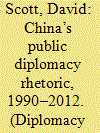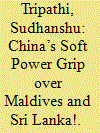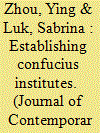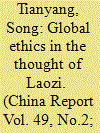| Srl | Item |
| 1 |
ID:
139827


|
|
|
|
|
| Summary/Abstract |
During Hu Jintao’s period of leadership, careful public diplomacy language was deployed by the People’s Republic of China from 2000–2012 to describe the international system and China’s role within it. The terms looked at in this analysis are those introduced in the 2000s to recalibrate the ‘multi-polarity’ [shijie duojihua] emphasis of the 1990s. These terms have been deployed within a general ‘reassurance diplomacy’ that emphasised concepts like ‘responsible Great Power’ [fuzeren da guo], ‘multi-lateralism’ [duobian zhuyi], ‘good neighbourhood policy’ [mulin zhengce], ‘democratisation of international relations’ [guoji guanxi mingzhuhua], ‘peaceful rise’ [heping jueqi], ‘peaceful development’ [heping fazhan] and ‘harmonious world’ [hexie shijie]. Ambiguities, implications, impact, and tensions surrounding these terms are considered, and China’s deliberate adjustments pinpointed. China’s soft power intentions emerge from its instrumentalist use of diplomatic rhetoric, though a credibility gap also emerged between actions and words by 2012.
|
|
|
|
|
|
|
|
|
|
|
|
|
|
|
|
| 2 |
ID:
163006


|
|
|
|
|
| Summary/Abstract |
While China’s rising imperialism and expansionism with aggressive assertions using military power are the well known facts to worry in the whole world, its (Beijing’s) increasing use of soft power diplomacy to support its expansionist designs not only in Asia but also in the world, is a cause of another serious concern for all nations including India. For the past many years China is consistently expanding its outreach through its ever evolving soft power diplomacy in the whole world, ostensibly for economic reasons in the form of new trade and other financial modalities - the latest being the “One Belt One Road”(OBOR) or Silk Road grand initiative - but the real or ulterior motive is to expand its sphere of influence and hegemony in all continents so as to become a super power or a global hegemon.
|
|
|
|
|
|
|
|
|
|
|
|
|
|
|
|
| 3 |
ID:
145889


|
|
|
|
|
| Summary/Abstract |
Soft power has become China’s new diplomatic tool to spread its influence in today’s changing international landscape. The establishment of Confucius Institutes (CIs) since 2004 to promote the understanding of Chinese language and culture is a striking example of how the government promotes soft power through cultural means. Through the macro- and micro-level analysis of CIs, this study shows that CIs fail to increase the soft power of China because many countries regard CIs as a propaganda tool and a threat to academic freedom and the local community. It shows that China’s soft power is not so attractive in the eyes of receivers. In fact, China’s aggressive cultural initiatives through the establishment of CIs have triggered another version of the ‘China threat’.
|
|
|
|
|
|
|
|
|
|
|
|
|
|
|
|
| 4 |
ID:
122641


|
|
|
|
|
| Publication |
2013.
|
| Summary/Abstract |
The thought of Laozi is of paramount importance in Chinese traditional culture. It is significant for us to discover some meaningful factors in Laozi's ideological systems in order to expand and strengthen China's soft power. Coincidently, there exists something in common between the thought of Laozi and ethics in Western political philosophy. The comparison of these ethical views of different value systems would help in better understanding the advantages of Chinese traditional culture in the process of China's soft power construction. This essay tries to summarise some common factors between the thought of Laozi and Western global ethics that can contribute to the construction of China's soft power. This could in turn offer an approach to establishing a 'Chinese school' in international political theories as well as contribute to global ethics architecture. This essay has been divided into three sections. The first discusses global ethics in Western political philosophy while the second investigates global ethics in Laozi's ideological system and then makes a contrast between Laozi's global ethics and those in Western political philosophy. In the final section, some fundamental principles in China's soft power construction will be explored.
|
|
|
|
|
|
|
|
|
|
|
|
|
|
|
|